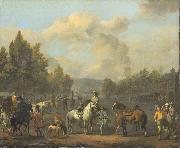|
|
|
|
|
LINGELBACH, Johannes
|
|
The_riding_school
|
|
|
|
|
|
|
|

|
|
Click to Enlarge
|
| LINGELBACH,_Johannes
|
The riding school
new26/LINGELBACH, Johannes-434976.jpg
|
|
|
|
|
|
| between 1637(1637) and 1674(1674)
Medium oil on canvas
Dimensions 68 x 82 cm (26.8 x 32.3 in)
cyf |
|
|
Dutch Baroque Era Painter, 1622-1674
German painter, active in the Netherlands and Italy. By 1634 his family had settled in Amsterdam, where presumably Lingelbach trained as a painter. According to Houbraken, he visited France in 1642 and arrived in Italy two years later. However, he is not mentioned in any document of 1644, although he is recorded in Rome from 1647 to 1649. The artist left Rome in 1650 and by 1653 was back in Amsterdam, where he remained until his death. Lingelbach is perhaps the only one of the Dutch Italianates with a catalogue of numerous signed and dated works to document his artistic development. The first two signed works are The Blacksmith (1650; Rome, Melmeluzzi priv. col., see Briganti, Trezzani and Laureati, fig. 10.1) and Self-portrait with Violin (1650; Zurich, Ksthaus). Unfortunately no certain works survive from the previous years. Kren (1982) attributed a series of works depicting Roman trades, some formerly ascribed to Pieter van Laer, to Lingelbach's early career. The original group consisted of three small paintings: the Acquavita-seller, the Cake-seller and The Tobacconist (all Rome, Pal. Corsini). While these paintings have some striking points in common with the Melmeluzzi Blacksmith of 1650 and the signed Dentist on Horseback (1651; Amsterdam, Rijksmus.), it is still uncertain whether they belong to Lingelbach's pre-1650 work or are by another hand
|
|
|
|
|
|
|